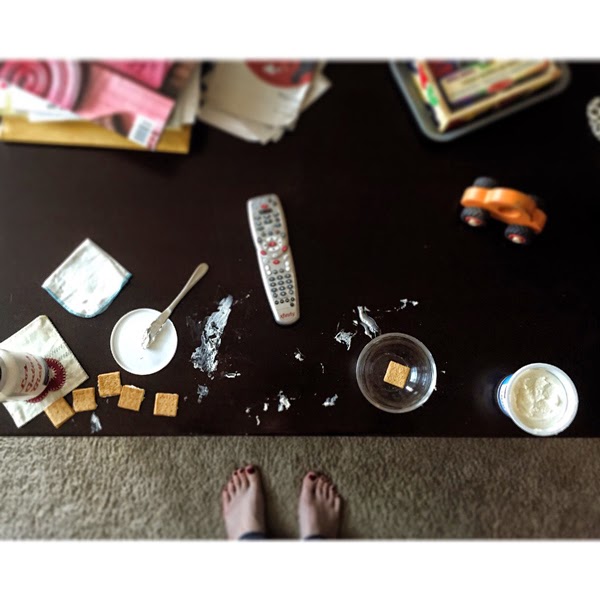 |
| Baz, at about 14 months... when I found this, I hugged him now...at 5 years. |
And we're back for Chapter 3: From Tantrum to Tranquility
So my favorite acronym from this chapter is this: HALT. As in: if your child is freaking out (or whining...or clinging...), take a moment to determine if he is Hungry, Angry, Lonely, or Tired. Think about how well you behave when you are one of those four things...and then, as the Husband likes to say, "debug your child." If you are aware of these things and head them off, then you can stop a tantrum before it starts.
Example: the boys are two of those things every Saturday after swim lessons. I keep snack bars in the bag for them to snack on in the car on the way to lunch. A snack and a little rest in their carseats gets them through lunch without incident. The one time I didn't give Walter a snack in the car...I was that mom sitting outside of Red Robin telling her screaming child that we can go back inside after he's gotten all his screams out because I won't let him scream at the table. I can't stop the screams, but I can remove him from the table and sit with him so that Hungry and Tired doesn't turn into Hungry Tired and Lonely (feeling dismissed because I won't hang out with him when he's cranky.)
Obviously - this doesn't always work and obviously misbehavior still happens. This is when the authors remind us to truly connect with our children:
"Fight the urge to punish, lecture, lay down the law, or even positively redirect right away. Instead, we need to connect....[this]moves them out of a reactive state and into a state where they can be more receptive to the lesson we want to teach and the healthy interactions we want to share with them." - pp 72-74
 |
| Walter's reaction when I say "show me your mad face!" |
"Spoiled children often grow up to be unhappy, because people in the real world don't respond to their every whim." - p. 91
So - how do you connect without spoiling? Connect, connect, connect.
"Connection is about walking through the hard times with our children being there for them when they're emotionally suffering, just like we would if they scraped their knee and were physically suffering." - p. 92
 |
| We call this "Bereaved Planking" and it's a universal toddler response to...anything they don't want to hear. |
Like I said above - this is the just the tip of the iceberg and I heartily recommend reading the entire book. We'll talk more about connection in chapter 4 (and the rest of the book, I presume.)
Oh, and for those who think "I'll just ignore the tantrum and it'll go away" - I suggest you read this blog, on the author's home page.
I'm going to end this with a quote I can't attribute...but it's one of my favorites so if you know the source please let me know! (It's also possible I'm fully misquoting...)
You spoil a child the same way you spoil fruit: put it in the other room and forget about it.















